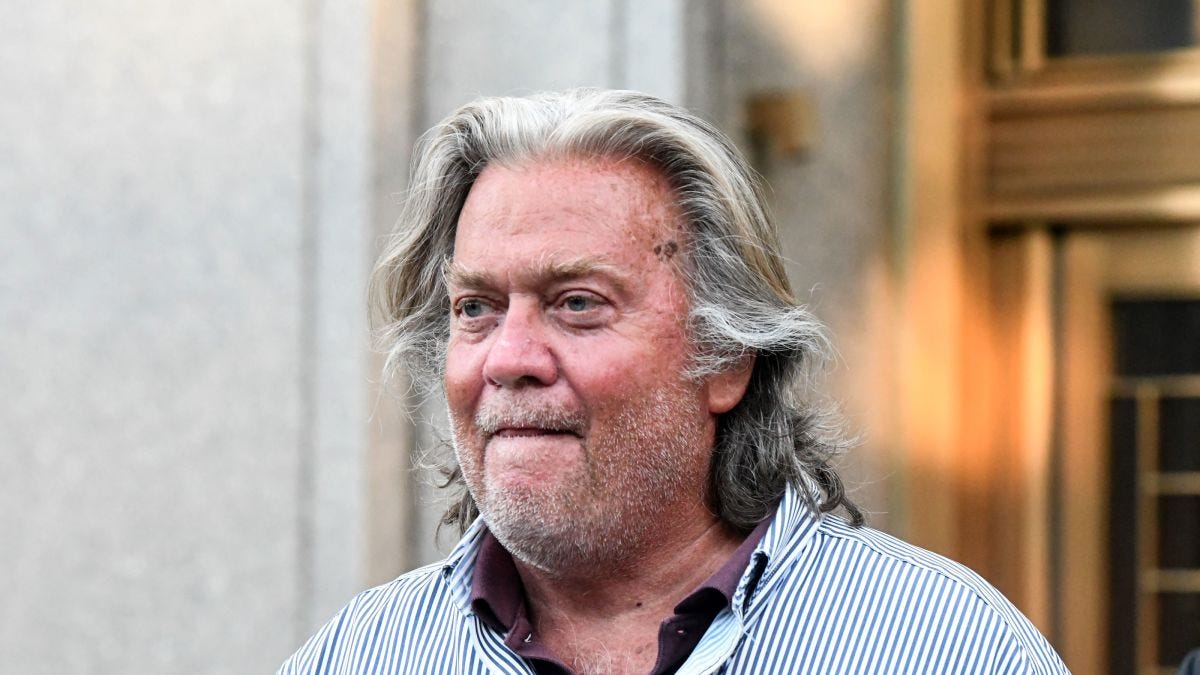The Report of the January 6 Select Committee, which comprises a history of and the various bases for its subpoena to Steve Bannon, also walks through the key reasons why his refusal to produce documents and appear is legally baseless. There’s a lot of legal mumbo-jumbo so I’m going to try and distill it here and create some digestible sips.
To understand the issue fully, it’s helpful to review the notion of “executive privilege” and how it does (and does not) work. This exercise reveals rather plainly why Bannon’s legal arguments, such as they are, should not shield him from prosecution.
Bannon can’t invoke the privilege because he doesn’t hold it
There’s a common misperception that a witness can invoke “executive privilege” as if it’s the Fifth Amendment right against self-incrimination. But it doesn’t work that way. Executive privilege belongs to the president (and most scholars and experts agree, only the sitting president), so in the absence of an actual presidential invocation, the privilege doesn’t exist. Bannon himself can’t claim the privilege based on what he believes the former president wants.
No one ever actually invoked the privilege
To invoke privilege is to create a rather large shield, so its use is qualified and is no small matter—and for good reason. Speaking about executive privilege, the Supreme Court held, “It is not to be lightly invoked. There must be a formal claim of privilege, lodged by the head of the department which has control over the matter, after actual personal consideration by that officer.” It comes as no surprise that the former president, who has never been keen on legal process, didn’t do that here. In fact, no one—specifically, neither President Biden nor former president Trump—ever contacted the Committee to invoke executive privilege formally. The most Bannon has produced is a letter from his lawyer who is claiming (third hand) that the former president was invoking the privilege and that he wants Bannon to “not produce any documents” and “not provide any testimony concerning privileged material”—an invocation that, taken at face value, nowhere meets the formal requirements of law.
Bannon Wouldn’t be Covered by the Privilege Anyway
This is the killer point: Executive Privilege applies to presidential communications. That is to say, it covers “communications in performance of [a President’s] responsibilities of his office and made in the process of shaping policies and making decisions.” (See United States v. Nixon, 418 U.S. 683, 708 (1974)). But Bannon had stopped working for the White House in 2017 after he was fired. He held no title or role. As the D.C. Court of Appeals held in In re Sealed Case (Epsy), executive privilege applies only to “official government matters.” Here, by this point, Bannon was just some guy—whom the former president allegedly plotted with to overthrow the election.
Bannon’s communications with others are excluded by definition
Reviewing the scope of the subpoena, most of what the Committee wants Bannon to testify about took place outside of any conceivable communications with the former president—things like how Bannon and others planned the rally, how he had suggested on his podcast that he had advance knowledge about impending violence, and what he said to cohorts at a nearby hotel where they allegedly discussed the plot to undo the election results. None of this is a “presidential communication” because, simply put, the former president wasn’t even there.
Bannon Can’t Simply Refuse to Cooperate
Bannon’s response to the subpoena was to refuse to produce any documents and refuse to appear at all. But that’s not how privileges work. If you have a reason to exclude specific communications under a privilege, then you must create what’s called a “privilege log” of the documents that you are not producing, as many first-year associates will report they have suffered to create. If you invoke the privilege as to a specific question, the asker can follow up with foundational questions like, “Was this a communication with the former president?” and “Were you an employee of the White House at the time?” If the answer to either of these is “no,” then you can be compelled by a magistrate to answer the question later. You can’t use the privilege to shield all of your documents and testimony.
Steve Bannon may have other reasons for refusing to produce documents or testify. But “executive privilege” isn’t a legally viable one, especially for him. He has as much standing to assert this as the “My Pillow” guy would. Given the utter nonsense of his actual legal position, it will be instructive to see how many and which Republicans still vote against the contempt resolution that the Committee will soon advance to the full House.





Congress and the DOJ need to move on this and prosecute him if they do not it will set a very dangerous precedent
Dragging it out is Trump's model - so Bannon's too. Lock him up.